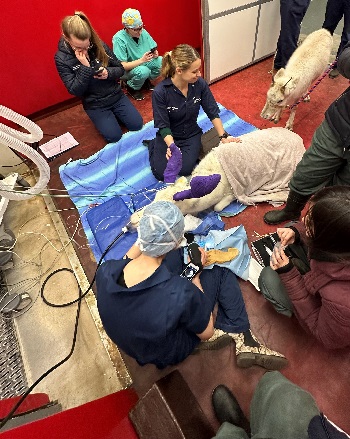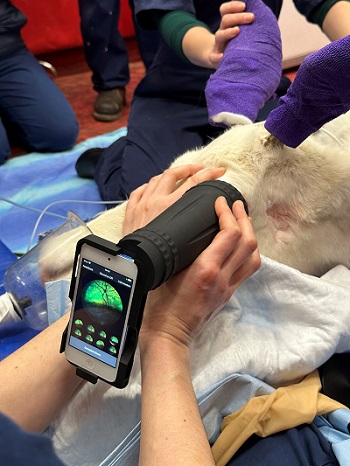Snowflake the Red-Eyed Reindeer
Clinical Connections – Autumn 2023
Maria-Christine Fischer, Lecturer in Ophthalmology, Sara Lawrence-Mills, Senior Clinical Training Fellow in Anaesthesia, and Carolina Palacios Jimenez,
Lecturer in Anaesthesia
Nine-year-old reindeer Snowflake received treatment from the Ophthalmology Service for a neoplastic lesion of the third eyelid.
The Ophthalmology Service is primarily based at RVC Small Animal Referrals, but the clinicians also collaborate with the equine, farm animal and exotics teams to support patients with eye problems.
Snowflake previously had a squamous cell carcinoma mass of the right lower eyelid, which was completely removed in 2018. Her owner brought her back in this year because they noticed an irregular third eyelid margin in the left eye.
Snowflake lives in a herd of about 20 reindeer and is kept outdoors on grass. As she is only very lightly pigmented, she requires protection from UV light in body area with no or little hair growth. To protect her eyes she wears a fly mask in the summer. Her food is supplemented with moss and lichen, imported from Finland.

Examination
On presentation Snowflake was bright and in good body condition, weighing 71kg. Both eyes were open and appeared comfortable and visual. Ocular reflexes and responses were present and as expected.
There was no evidence of recurrence of the squamous cell carcinoma on the lower right eyelid on clinical examination. Snowflake was diagnosed with mild cataracts in her right eye, deemed unlikely to interfere with her vision.

The margin of her left third eyelid was nonpigmented and displayed a not well defined mass-like lesion, with an irregular surface on the leading edge, appearing consistent with a squamous cell carcinoma. The remainder of the ocular structures presented without abnormalities.
The examination of the back of the eye, the fundus, was a highlight. It revealed a yellow-green tapetum with prominent vasculature and dark optic nerve heads. The tapetum is the reflective part of the back of the eye that creates the ‘eye shine’ which changes colour depending on the season.
The ophthalmology team and observing students found it fascinating to see Snowflake’s tapetum colour in transition from winter to summer. The new fundus camera, purchased thanks to support from the Holliday Foundation and funds raised by the RVC Animal Care Trust, enabled everyone to become part of this unique experience.
Treatment and anaesthesia
The third eyelid was removed under sedation and after the application of local anaesthetic blocks and topical tetracaine eye drops. Cryotherapy was applied to the wound edge as an adjunctive therapy. The third eyelid was submitted for histopathology, which confirmed the diagnosis of squamous cell carcinoma. The tumour had been removed completely.
Risks and complications associated with the surgery in other species are medial canthal pocket syndrome (resulting in accumulation of mucoid ocular discharge in the conjunctival sac), reduced tear production and prolapse of orbital fat.
Standing sedation was performed using medetomidine and butorphanol via intramuscular injection prior to catheter placement. Snowflake was maintained with variable rate infusion of medetomidine. Positioning Snowflake with her head upright helped to prevent any aspiration of saliva. Monitoring included assessment of the heart rate, respiratory rate and non-invasive blood pressure as well as capnography (carbon dioxide level) and pulse oximetry (oxygen saturation).
Supraorbital, auriculopalpebral, infratrochlear blocks and local infiltration of the base of the third eyelid were performed using mepivacaine. The patient was reversed with intramuscular atipamezole to antagonise the medetomidine.
There are few publications detailing anaesthesia in reindeer and this protocol was a novel approach to maintaining a safe level of sedation in a well domesticated animal. The use of these nerve blocks to facilitate ophthalmic surgery have not been reported before and are in the process of being published.
Snowflake made a good recovery from the surgical procedure and both of her eyes appear to be comfortable. On discharge Snowflake was prescribed meloxicam (alternate days), gentamycin and bromfenac eye drops to prevent infection and reduce the inflammatory response.
